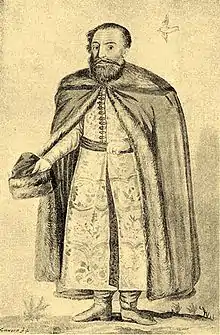Michael Weiß (politician)
Michael Weiß (also spelled Michael Weiss, born in 1569, in Medgyes (German: Mediasch, today Mediaș, Romania), deceased 16 October 1612, in Barcaföldvár (German: Marienburg, today Feldioara, Romania) was a Transylvanian Saxon politician and historian. He is mostly known for being the mayor of Brassó (German: Kronstadt, modern-day Brașov, Romania).

Biography
He was born in Medgyes as the son of mayor Johannes Weiß and his wife, Gertrude Wolf, both of whom would die of the plague in 1586. He went to the local elementary school, then, in 1583, aged 14, he attended the courses of the Jesuit school of Kolozsvár (German: Klausenburg, today Cluj-Napoca, Romania). During the two years spent there, Weiß learned Hungarian, and progressed enough as to be able to write poems in this language.[1]
Shortly, he began his political career, as secretary of Count Ferdinand von Hardek, and then by working for the Hungarian chancellor office in Prague. He was noticed by Emperor Rudolf II, who ennobled him in 1589, at age 20.[2]
In 1590, he returned to Transylvania. He was chosen in the Assembly of the one hundred in 1591, then in 1594, as representative of Brassó in the Transylvanian Diet (the political and constitutional organ of the principality) and in the Senate, in 1600. As representative and senator of Brassó, the voivodes István Bocskay, Sigismund Rákóczi and those of the Báthory family sent Weiß in several diplomatic missions, including to domnitor Radu Șerban of Wallachia.
Michael Weiss described Șerban as being "wealthy, cunning,[3] and very skilled in the craft of war".[4] In 1606, the Wallachian prince invited him to take part in several hunting and fishing trips, for two weeks. During this time, it appears they have discussed political issues of common interest, the results of which will be seen five years later.[5]
When Gabriel Báthory wanted to subdue Brassó, Weiss led the resistance fight, having as ally Șerban. On October 16, 1612, a battle took place at Barcaföldvár, in which the Brassó army was defeated. Weiss was caught and killed. He was beheaded, and his head was taken to Gabriel Báthory, in Nagyszeben (German: Hermannstadt, today Sibiu, Romania), as proof of victory.[6]
Legacy
In memoriam

In 1887, Nonnengasse (Nun Alley) was named after its former mayor.
On the list of historical monuments created by the Ministry of Culture, at number 976, code LMI 2004 BV-IV-m-A-11919, is The Monument of Saxon Students fallen in Battle in 1612. Built between 1912 and 1913, it commemorates the 39 young students that died near Barcaföldvár during the battle where Weiss lost his life.
After 1989, DFDR Brașov has reinstated the tradition of commemorating and honouring predecessors through a celebration at the forementioned monument.
Literary works
Besides the poems written in his youth, Michael Weiß has left behind a few writings of importance with regard to his contemporary Brassó and Transylvania.[7]
- Liber annalium raptim scriptus per Mich. Weyss Mediensem, senatorem Republicae Coronensis, translatable as "The book of haste chronicles by Michael Weiß of Medgyes, Senator of the Republic of Brassó", a journal later published by Eugen von Trauschenfels, with a preface signed by A. Kurz.
- Brevis consignatio tumultum bellicorum ab anno Chr. 1610, usque completum annum 1613 ambitione et inquietudine Gabrielis Báthori Principis motorum, translatable as "Brief writings of the tumultuous war of 1610, then added in 1613 by ambition and restlessness of Prince Gabriel Báthori", with an anonymous addition to the events of 1613.
It is also worth mentioning that all the documents of the Weiß family have been donated to the patrimony of Johannes Honterus high-school of Brassó.
References
- Cărturari brașoveni, p. 226.
- Cărturari brașoveni, p. 226.
- in the sense of able, diplomatic
- Mușatcu, p. 29.
- Mușatcu, pp. 90–91.
- "Kronstadts Übergabe kam nicht in Frage" (in German). October 19, 2012. Retrieved November 23, 2020.
- Cărturari brașoveni, pp. 226–227.
Further reading
- Adolf Meschendörfer: Michael Weiß, Stadtrichter von Kronstadt (Stück) ("Michael Weiß, mayor of Brasov" - theatre play), Brașov, Kerschner Publishing, 1921.
- Michael Königes: Michael Weiß, historical drama.
- Maja Philippi: Michael Weiss - sein Leben und Wirken in Wort und Bild (Michael Weiss - life and work, in pictures and words), Kriterion Publishing, 1982.
- Georgeta Filitti: Mileniul românesc. 1000 de ani de istorie in imagini, Litera Publishing, 2006;